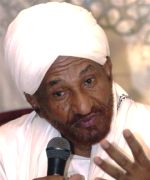Sudan’s opposition seeks local Darfur settlement
Nov. 23, 500 (KHARTOUM) — Sudan’s leading opposition forces agreed to seek a national settlement for the Darfur crisis, rejecting foreign solution for the war-torn region.
 More than 30 representatives of opposition parties, civilian organizations, prominent Darfur figures and student unions Tuesday signed the “Document of National Forces for Settling Darfur Crisis.”
More than 30 representatives of opposition parties, civilian organizations, prominent Darfur figures and student unions Tuesday signed the “Document of National Forces for Settling Darfur Crisis.”
The move, which was strongly criticized by the ruling National Congress Party, was led by Umma Party chief and former Prime Minister Sadiq al-Mahdi, Secretary General of Popular Congress Party Hassan al-Turabi and the head of the Sudanese Communist Party, Mohamed Ibrahim Nugud.
The signing ceremony took place in Omdurman in Khartoum State amid the acclamation of thousands of supporters who lashed out at the government’s policies and called for a comprehensive settlement for the conflict of Darfur in West Sudan.
Speaking to the audience, al-Mahdi said there are only three scenarios for the issue of Darfur, “one of which is to continue in failure and exposing the country’s dignity by seeking external solutions and another is to let the foreigners tyrannize the country through their scenarios.
“The only rightful option is based on national consensus and the document signed by the national forces is the right solution,” al-Mahdi added.
For his part, Nugud slammed intense foreign interferences in national matters through the Darfur issue.
“U.S. interference to achieve reconciliation between warring factions in Darfur is an impossible matter. … We are back to the mockery of international struggle over the province,” Nugud said.
He stressed the solution is strictly in the hands of the Sudanese people through its political and civilian organizations.
The signed document basically affirmed Sudan’s unity, considering the crisis in Darfur an indivisible part of the overall problems in the country.
It also called for effective action to unify the various armed movements and political groups in Darfur on a single mechanism for dialogue and building a favorable atmosphere for political dialogue through the release of all prisoners.
(UPI/ST)
